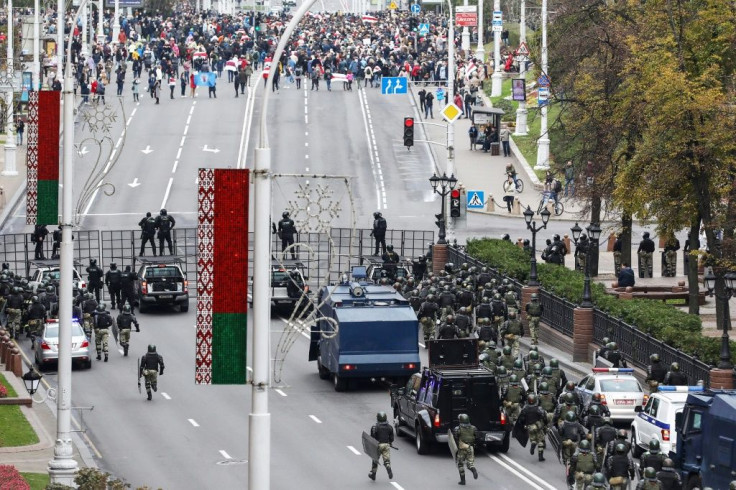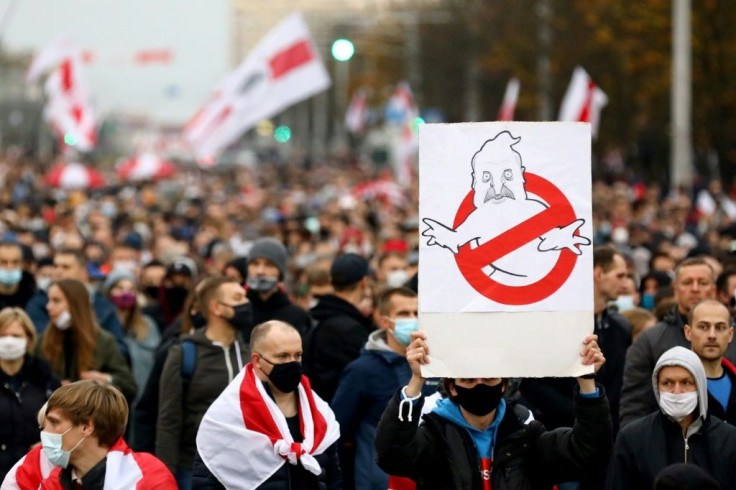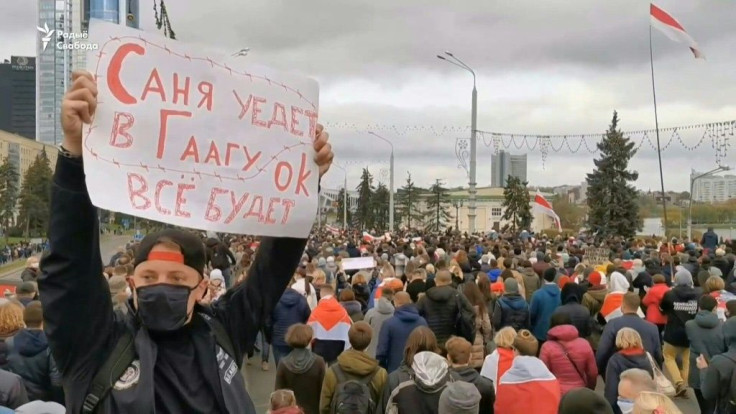Belarus Opposition Calls General Strike As Tens Of Thousands March Against Lukashenko
Belarusian opposition leader Svetlana Tikhanovskaya on Sunday called on the country to strike from Monday as 100,000 people took to the streets of Minsk to protest against embattled strongman leader Alexander Lukashenko.
The march took place on the last day of an ultimatum set by the opposition for Lukashenko to resign after months of mass protests or face a general strike.

"Today the regime has once again shown Belarusians that violence is the only thing it is capable of," Tikhanovskaya said on her Telegram channel.
"Therefore tomorrow, October 26, a national strike will begin."
Police used stun grenades to disperse protesters and mass arrests were underway, according to opposition Telegram channels, showing scenes of panic with many fleeing.

Nearly 160 people were arrested in the early evening, human rights organisation Vesna said.
Videos taken by bystanders and circulated by local media earlier showed a convoy of buses carrying security personnel to the city centre along with metal cordons.
A dozen metro stations in the centre of Minsk were closed to deter demonstrators from gathering and mobile internet was restricted.

Exiled Tikhanovskaya this month gave President Lukashenko a deadline of two weeks to resign, halt violence and release political prisoners, warning he would otherwise face a crippling general strike from Monday.
Some protesters on Sunday chanted "strike!" as they marched through the streets, with local media estimating the crowd at least 100,000 people.
Tikhanovskaya, a 38-year-old political newcomer, fled Belarus after claiming victory in an August presidential election that Lukashenko, 66, himself claimed to have carried for a sixth term. She has been rallying support from European leaders and calling for new elections.

During a visit to Copenhagen on Friday to meet Danish Foreign Minister Jeppe Kofod she called for a repeat ballot "as soon as possible", and in separate statement said a date for the vote must be decided by the end of the year.
Yet she also conceded that it was unclear how many Belarusians would answer the call for a general strike Monday, with many people anxious about government intimidation and dismissal from positions at state-run enterprises.
"I know a lot of people are afraid to lose their jobs," she told AFP.

"We're not organising the strikes ourselves, it's people themselves who decide if they're ready or not."
The Poland-based Nexta Telegram channel, which has been mobilising recent post-election protests, called on its two million followers to gather at 2:00 pm (1100 GMT) in the centre of Minsk.
"It is time to return the law, development, fair elections and a full set of civil rights to Belarus," Nexta wrote, days after it was deemed "extremist" by a court in Minsk.
"The last day of the People's Ultimatum has gone."
After an initial police crackdown on post-election demonstrations that resulted in thousands of detentions and allegations of torture in prisons, the authorities warned this month they would sanction the use of live ammunition to disperse protesters.
But anti-Lukashenko demonstrators continued to congregate in cities throughout the country despite the threat, tens of thousands gathering each weekend.
Several hundred women marched through Minsk on Saturday to protest against Lukashenko, with reports of detentions.
Plans for a pro-government rally were binned on Friday, officials said, ostensibly over safety concerns and difficulties ensuring transport for Lukashenko supporters coming from the regions.
The European Union and Western countries have slapped a wave of sanctions for vote-rigging and police violence on allies of Lukashenko, who has leaned heavily on support from staunch ally Russia in the unrest.
Russian President Vladimir Putin during the peak of the political instability promised Lukashenko a $1.5 billion loan to bolster the struggling economy and offered the support of his security services if the instability deteriorated.
Vitali Shkliarov, a Harvard University fellow who has advised presidential candidates in the United States, Russia and Ukraine was released under house arrest earlier this week.
The European Parliament on Thursday awarded the Sakharov Prize for human rights to the movement opposing Lukashenko.
© Copyright AFP 2024. All rights reserved.











